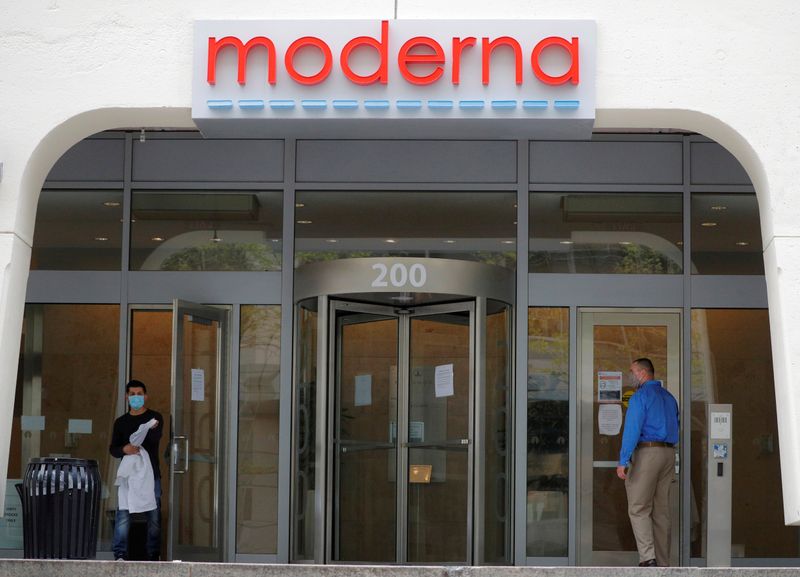By Julie Steenhuysen
CHICAGO (Reuters) - Private contractors hired by Moderna Inc to recruit volunteers for its coronavirus vaccine trial failed to enroll enough Black, Latino and Native American participants to determine how well the vaccine works in these populations, company executives and vaccine researchers told Reuters.
To make up for the shortfall, Moderna slowed enrollment of its late-stage trial and instructed research centers to focus on increasing participation among minority volunteers, the company said. The effort is being bolstered by academic researchers who have longstanding relationships with organizations in Black and other minority communities.
Five investigators working on the Moderna trial said in interviews that commercial site investigators quickly filled a large portion of the 30,000-person study with mostly white volunteers.
But COVID-19 infects Blacks in the United States at nearly three times the rate of white Americans, and they are twice as likely to die from the virus, according to a report by the National Urban League and other studies.
And communities of color count prominently among healthcare workers and populations at high risk of COVID-19 complications, making them among the first likely to be eligible for a new vaccine, experts said.
Dr. Paul Evans, chief executive of Velocity Clinical Research in Durham, North Carolina, whose company was hired to test the Moderna vaccine at five sites, said efforts to enroll volunteers from diverse backgrounds to provide proper population balance is "notoriously difficult" in any clinical trial.
"If there's a problem with recruiting minorities, and there is, you can't fix that overnight," he said.
Black Americans made up only about 7% of the trial as of Sept. 17. That should be closer to 13% to reflect the actual U.S. population.
During the last two weeks of September, Moderna said it increased the proportion of Black enrollment, but declined to provide details.
Increased trial participation could help address distrust between communities of color and the medical industry after years of underrepresentation in pharmaceutical research, historical horror stories of medical experimentation without consent, and socioeconomic and health access inequities, vaccine experts and public health officials say.
One-fourth of Moderna's 100 trial sites are run by academic centers that are part of the National Institute of Health's (NIH) COVID-19 Prevention Trials Network (CoVPN), while the rest are largely commercial subcontractors. A contract research organization called PPD was hired by Moderna to oversee the trial sites.
"We are essentially making up" for the commercial sites, said one CoVPN investigator not authorized to speak publicly.
Dr. Larry Corey, co-leader of CoVPN, said the NIH has invested in clinical trial sites with outreach programs staffed by doctors and nurses with ties to minority communities.
"That's not something that is part of the business model of commercial research organizations," Corey said.
Moderna is one of the furthest along in the U.S. race for a vaccine seen as essential to ending a pandemic that has claimed over a million lives worldwide. It received more than $1 billion in government funding to develop and produce its candidate, and another $1.5 billion to supply it to the American public.
ENTRENCHED BARRIERS, VACCINE HESITANCY
PPD referred requests for comment to Moderna. But two of the commercial firms said they had received overwhelming trial participation interest from white volunteers. Several researchers said they struggled to overcome the entrenched barriers that traditionally limit minority enrollment.
Moderna planned from the start to recruit a racially diverse group of volunteers, Chief Executive Stephane Bancel told Reuters. The results were decidedly mixed, and recruitment at some underperforming sites was halted, he said.
On Moderna's website, as many as 17 of the 100 participating trial sites are listed as active but not recruiting, without listing a reason.
Bancel said the enrollment slowdown, announced in early September, will not keep the company from seeking emergency use authorization (EUA) for its vaccine in the United States, provided initial results show it to be safe and effective.
Moderna could seek an EUA for inoculating high-risk groups such as healthcare workers as early as November.
The company said it will provide complete data on the more diverse trial group in its formal application seeking commercial approval from the U.S. Food and Drug Administration next year.
Even with that approval, there are likely to be hurdles to convincing Black Americans to take the vaccine.
According to a Pew Research Center survey released in September, only 32% of Black adults said they would definitely or probably get a COVID-19 vaccine, compared with 52% of white adults, 56% of Hispanics and 72% of Asian Americans.
Some trial investigators attributed the minority recruitment shortfall in part to the demands of testing a coronavirus vaccine at unprecedented speed.
"It essentially was becoming first-come, first-served, and it was skewing towards not getting enough minorities," said Dr. Rambod Rouhbakhsh, a lead researcher at the MediSync Clinical Research Hattiesburg Clinic in Petal, Mississippi, a commercial site hired by PPD for the Moderna trial.

Dr. Moncef Slaoui, who runs the U.S. Operation Warp Speed program that has funded Moderna's vaccine and others, joined a virtual town hall last week organized by civil rights leader Jesse Jackson's Rainbow Push coalition in Atlanta.
He told Black leaders that minority enrollment in Moderna's trial had fallen short and appealed for help in encouraging volunteers from the community.
"Developing a vaccine that is not used in a fraction of the population is the same as having no vaccine," Slaoui said. "It is absolutely useless."